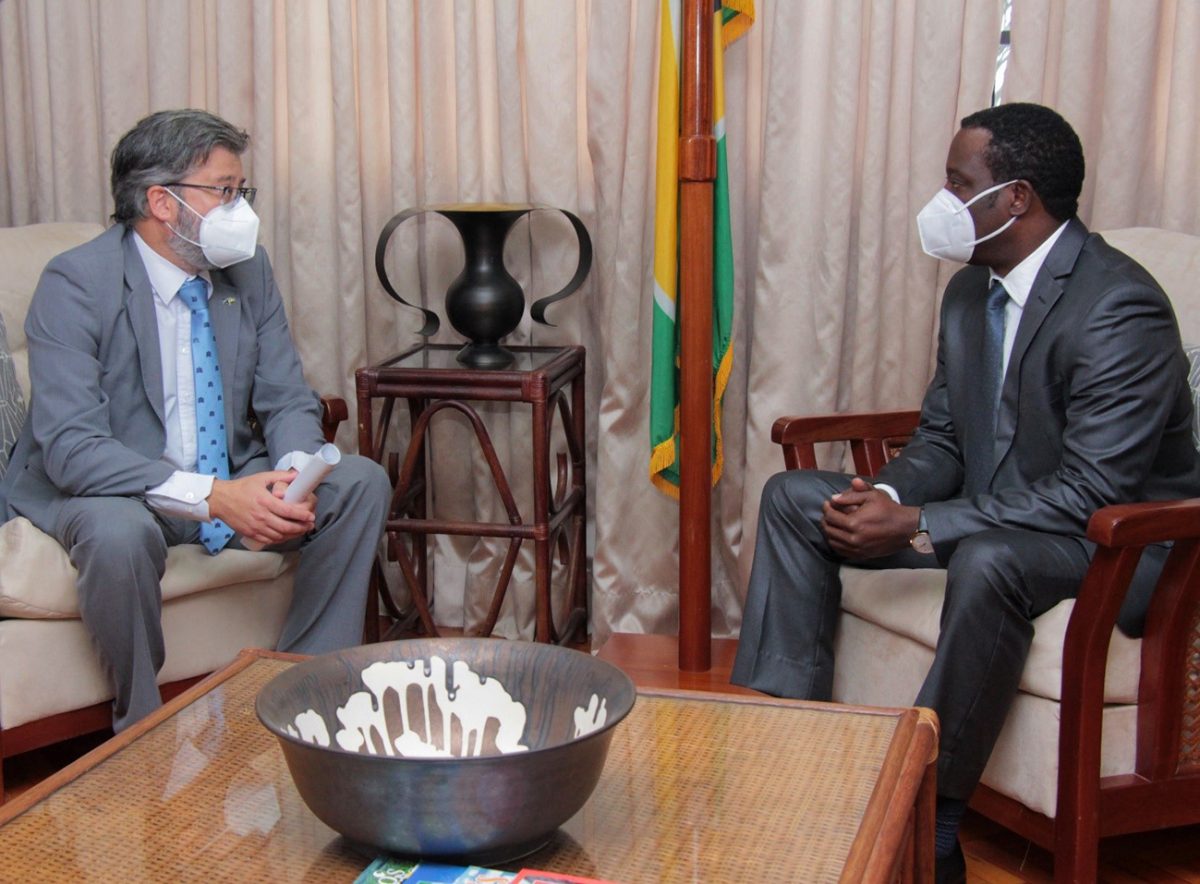The European Union (EU) Election Observation Mission (EOM) which was here for the March 2nd 2020 general elections is due shortly for discussions with stakeholders on reform recommendations that it had made in its final report.
Ambassador Extraordinaire and Plenipotentiary of the European Union, Fernando Ponz Cantó, yesterday called on Minister of Foreign Affairs and International Cooperation, Hugh Todd to discuss the upcoming visit of the EU EOM.
According to a release from the Ministry of Foreign Affairs, the Ambassador iterated the EU’s availability to provide technical support for electoral reform in Guyana.
The EU’s EOM was withdrawn from Guyana on March 20 last year amid the deadlock over the results of the general elections and the emerging COVID-19 pandemic.
It said then: “The EU EOM calls on all stakeholders to complete the electoral process in a credible and transparent way in accordance with legal requirements”.
The results were not concluded until August 2nd, 2020
The EU EOM fielded 55 observers from 25 member states and Norway on polling day. Apart from the 20 short-term observers who were deployed to join the 14 long-term observers, there were eight diplomats from EU member states accredited to Guyana, ten core team members and three observers from Brussels.
The long-term observers had been observing electoral preparations and campaign activities across the country since February 4.
In its final report on the March 2nd elections issued on June 5th last year, the EU EOM said that the integrity of the entire electoral process was “seriously compromised” by the non-transparent tabulation of results in Region Four, for which it blamed senior Guyana Elections Commission (GECOM) officials.
“Voting, counting and the tabulation of results in nine of Guyana’s ten regions were generally well managed,” the EU EOM said. “However, the integrity of the entire electoral process was seriously compromised by the non-transparent and non-credible tabulation of results in the largest and decisive Region 4 by senior Guyana Elections Commission officials, acting in blatant violation of the law and High Court orders issued in this regard,” it added.
The report added that after a transparent, largely uncontested tabulation was completed in most regions, “the process abruptly derailed into chaos and confusion amidst obstruction tactics by election officials” in Region Four.
“On 5 March, the Returning Officer (RO) [Clairmont Mingo] declared results without having tabulated them in the presence of party agents and observers as required by law,” the report noted. It said that an emergency meeting of GECOM’s board ended inconclusively, displaying a broken commission unable to control unfolding events. “By failing to act decisively, GECOM abdicated its constitutional duty to take all actions necessary to ensure compliance with the law and oversee a proper tabulation process,” it said.
The report said that after these results were annulled by the Chief Justice as unlawful, “GECOM still allowed the same RO to rush through the rest of the tabulation without any transparency in blatant violation of the law and explicit court orders, and to make a second declaration of unverified results on 13 March.”
The EU mission highlighted that the results declared by Mingo on March 13 were not credible. “These results gave APNU+AFC and PPP/C 136,057 and 77,231 votes respectively for the general elections in Region 4, enough for the ruling coalition to overcome the opposition’s advantage in the other regions and take the lead nationally. Supported by the online publication of almost all Region 4 polling station results protocols, PPP/C’s parallel tabulation suggested the opposite outcome. It gave the ruling coalition and the opposition 114,416 and 80,150 votes, respectively, in the region, thus placing PPP/C ahead nationally,” the report said.
In this light, the EU mission recommended the adoption of clear written procedures for the transmission and tabulation of election results, notably to ensure consistency of the process in all regions, adequate traceability of handed over electoral documents, and possibility for all authorised stakeholders to examine SOPs as required by law.
It also recommended that the obligation to accompany any declaration of results by simultaneous publication of detailed polling station results and digital copies of all SOPs should be incorporated into law. In addition to the number of valid votes cast for each candidates’ list, these detailed results should also include all elements of electoral accounting to allow control of their coherence, such as number of registered voters, voters who voted, rejected ballots, spoiled ballots, etc., the report said.
The EU EOM recommended a national consultation process to overhaul the composition and functioning of GECOM, notably to ensure a more inclusive representation of the various components of the Guyanese society and political spectrum.





